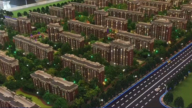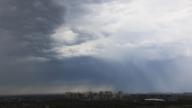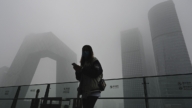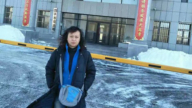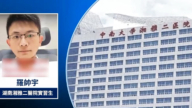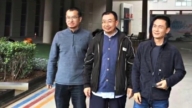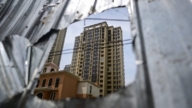【新唐人2013年07月02日訊】新疆局勢進一步緊張,29號早上,中共中央政治局常委俞正聲帶領工作組抵達烏魯木齊。新疆武警開始全天候巡邏,官方還加強了網絡監控,查處19名在微博等網絡平臺發消息的網民。中國問題研究人士指出,事件的關鍵不在於維、漢衝突,而是少數民族和中共的衝突。
29號,俞正聲帶頭和另3名官員抵達新疆,他們分別是中央政法委書記孟建柱、公安部部長郭聲琨、和國家民委主任王正偉。隨行工作組中,還有中共政法委的其他高層官員。
旅美中國問題研究人士張健表示,派出的官員級別越高,顯示官方對目前的新疆局勢越緊張。
旅美中國問題研究人士張健:「新疆出現這個事件,足以證明中共對少數政策的徹底失敗。那中共的高層可能對這個事情震驚、害怕。所以以前,就是在江(江澤民)時代的那個維穩的意識形態又出現了。導致了這麼多相關部門的一把手,全部到了新疆,去坐鎮指揮。」
俞正聲等人到達烏魯木齊以後,烏魯木齊當天就封鎖市區主要道路,進行了大規模武警演習,至少有一萬名軍警參加,也是09年「7‧5事件」以來,規模最大的一次。當晚,孟建柱還要求新彊武警部隊,「實行24小時全天候執勤巡邏」。
張健:「這次他們這些高層集體到了新疆之後,足以證明,第一、維穩還是他們首先要確保的一個任務;第二、為了維穩,他們不惜去給少數民族人民,增加更多的生活和其他領域的困擾;第三、這個事態過後,我們還會看到,中共對少數民族,或者對新疆的政策,還是原來那樣。」
一名烏魯木齊張姓市民形容,官方採取的「強勢維穩」手段,造成烏魯木齊的形勢非常緊張。
烏魯木齊市民張先生:「現在烏魯木齊街道和市場上,人比平時少很多。就是感覺氣氛和當年『7‧5』一樣。我現在最擔心的就是它(中共)切斷網絡。」
新疆當局除了加強對市區的控制,還加強了網絡監控,公安查處了19名所謂的「網上編造謠言者」。不僅是新疆網民,甚至連廣東的網民,也因為引用《法新社》記者拍攝的,鄯善縣衝突事件圖片和部分文字,遭到東莞警方的恐嚇。
張先生:「這些事情發生以後,每次都是官媒報導了以後,很快就刪除了。並且官媒報導的也很簡短。看到其他媒體採訪被攔截、停相機、然後網民發佈消息被抓,已經有19起了。對於官方消息,我是持慎重態度的。」
目前約有900萬名維族人住在新疆。而新疆「7‧5事件」再過幾天就到了4週年。烏魯木齊市警方19號已宣佈,將展開嚴打專案行動,為期三個月。
張健指出,事件的關鍵不在於維、漢衝突,或少數民族和中共的衝突,而是中共這個體制,確實對全人類犯下了大罪。
張健:「在中國來說,對少數民族它也是天怒人怨。那麼在多數民族——漢族當中,中共就受到了歡迎嗎?任何一個民族,都對中共深惡痛絕。它所犯下的罪行,已經是天怒人怨,它所推行的制度,是完全不符合當今這個民主潮流的。」
2009年的「7‧5事件」造成200多人喪生。當時西方媒體普遍認為,中共實行的少數民族政策一直存在問題,但官方並沒有檢討少數民族政策,反而把矛頭對著境外異議人士熱比婭,想要把問題焦點從國內轉向國外。
流亡海外的「世界維吾爾代表大會」主席熱比婭,6月30號與其他30多名抗議者,在中共駐東京使館前示威。在此前一天,熱比婭在網站視頻中表示:「新疆情況非常嚴峻,我們一直要求中國政府展開對話,但得不到任何回應,北京根本不想聽我們的意見。」
採訪/劉惠 編輯/尚燕 後製/肖顏
What Has Caused Recent Incidents in Xinjiang?
On June 29, the China Central Committee working group,
led by Yu Zhengsheng, arrived in Urumqi, Xinjiang.
Armed Police have started 24 hour patrols of the city,
and officials have also increased internet monitoring.
19 web users who released messages about the
recent incidents have already been investigated.
China experts says the key issue of
this incident is not a racial problem.
It is a conflict between oppressed ethnic
minorities and the Chinese Regime.
On June 29, Yu Zhengsheng and
three other officials arrived in Xinjiang.
The Working Group includes Meng Jianzhu,
Secretary of the Central Political and Law Committee.
It also includes Guo Shengkun, Minister of Public Security
and Wang Zhengwei, Chief of State Ethnic Affairs Committee.
Other senior officials of the CCP Politics and
Law Committee have also traveled to Xinjiang.
US-based China expert Zhang Jian says that in China,
if high level officials are sent, it indicates a critical situation.
Zhang Jian: “The Xinjiang incident proves the complete
failure of Communist policies toward Chinese minorities.
Top officials of the Chinese Communist Party
(CCP) are worried and shocked by this incident.
Thus, it is like the era of Jiang Zemin, to maintain stability.
They have sent so many high officials
to control the situation in Xinjiang.”
As Yu’s group arrived in Urumqi, all main
roads were blocked on the same day.
Armed police have carried out a large-scale
exercise, with at least ten thousand police.
This is the largest incident since the 2009 “7-5 Incident”.
That night, Meng Jianzhu also required “24-hour patrol duty.”
Zhang Jian: “This time, these high
level executives traveled to Xinjiang.
It proves, firstly, that their priority
is to ensure stability is maintained.
Secondly, in order to safeguard stability, they won’t
hesitate to destroy the lives of the ethnic minorities.
However, this will bring extra trouble.
Thirdly, we will see that when this is over, CCP policy
toward these minorities, and Xinjiang, will remain the same.”
‘Zhang’, an Urumqi citizen described that the official stance
of “maintaining stability" has resulted in a severe situation.
‘Zhang’, Urumqi citizen: “Now you can see far less
people than usual in the streets and markets in Urumqi.
It has the same feelings as the atmosphere of ‘7-5’.
I worry most that it (CCP) could cut off our internet.”
Xinjiang authorities are strengthening control of
urban areas, as well as monitoring on the internet.
It has investigated 19 so-called “fabricated internet rumors."
It is not only netizens in Xinjiang that have faced trouble.
Netizens in Guangdong have also come under threat,
after using images and text from “AFP" as references.
They received intimidation from Dongguan police.
‘Zhang’, Urumqi citzen: “Every time an incident occurs,
official media reported, and then they quickly deleted it.
Official media reports are very brief. For other medias,
interviews are intercepted or camera’s are confiscated.
If netizens publish messages online, they are intercepted.
So far, there have been 19 such cases already,
but for me, I don’t quite trust official sources.”
There are approximately 9 million
Uighurs living in Xinjiang Province.
The fourth anniversary of the Xinjiang
“7-5 Incident” is in a few days.
Urumqi police announced on June 19 that it will
expand it’s crackdown action for three months.
China export Zhang Jian says that the key
issue of this incident is not a racial problem.
It is the conflict between oppressed
ethnic minorities and the Chinese Regime.
Zhang Jian: “The CCP widely suppresses ethnic minorities.
Due to CCP propaganda among the Han Chinese in
Xinjiang, ethnic minorities are not widely welcomed.
So ethnic minorities are against the Chinese regime.
The crimes of the CCP are shocking, and the Communist
system sits totally counter with today’s democratic movement.”
The 2009 “7-5 Incident” caused the death of over 200 people.
At that time, western media generally believed that
the CCP minority policies had been problematic.
However, the Chinese Regime did not review its policy.
Instead, it spearheaded a campaign against
Uighur dissident Rebiya Kadeer, in order to turn
it from a domestic issue to an international issue.
The exiled “World Uyghur Congress" leader
Rebiya Kadeer, protested with 30 others on
June 30 in front of the Chinese embassy in Tokyo.
The day before, Kadeer videos on the internet
said that, “the situation is very grim in Xinjiang.
We have been asking for dialogue with the Chinese
government, but have not had any response.
Beijing does not want to hear our views.”



